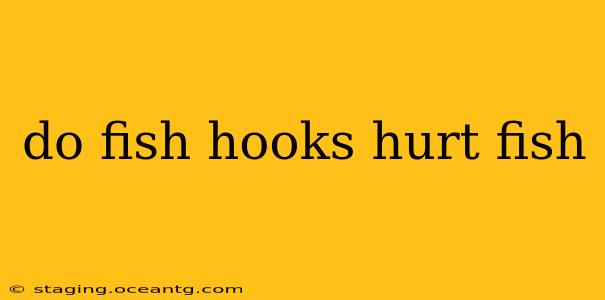Do Fish Hooks Hurt Fish? Understanding the Impact of Angling
The question of whether fish hooks hurt fish is complex and elicits strong opinions from anglers and conservationists alike. While the simple answer is "yes," the degree of pain and suffering, and the long-term effects, are subjects of ongoing research and debate. Let's delve deeper into the science and ethics surrounding this important topic.
How Do Fish Hooks Cause Injury?
Fish hooks inflict trauma in several ways. The initial penetration of the hook causes a puncture wound, damaging tissue and potentially severing nerves and blood vessels. The barb, a crucial feature of most hooks, prevents easy removal, exacerbating the injury. As the fish struggles, the hook can further tear tissue, causing significant pain and potentially leading to infection. The struggle itself also contributes to stress and exhaustion.
Do Fish Feel Pain?
Scientific evidence increasingly supports the conclusion that fish do, indeed, feel pain. Their nervous systems, while different from mammals, possess structures and neurochemicals associated with pain perception. Studies have shown that fish exhibit behavioral changes (such as reduced feeding and increased erratic movement) consistent with pain responses after being hooked. However, the extent to which they experience pain comparable to humans is still an area of ongoing research.
What are the Long-Term Effects of Hooking a Fish?
The impact of a fish hook goes beyond the immediate trauma. Even if the hook is successfully removed, the injury can lead to:
- Infection: Puncture wounds are susceptible to bacterial infections, which can weaken the fish and increase mortality risk.
- Scarring: Healing tissue can leave behind scars that may impair swimming ability, feeding efficiency, and overall fitness.
- Mortality: In some cases, the injury, stress, or infection proves fatal, even after release.
How Can Anglers Minimize Harm?
Responsible anglers strive to minimize the suffering of fish. Here are some key practices:
- Use barbless hooks: Barbless hooks cause less tissue damage and are easier to remove, leading to quicker release and reduced injury.
- Proper handling techniques: Keeping the fish in the water as much as possible, using appropriate tools for hook removal, and minimizing handling time can reduce stress.
- Quick release: Release fish as quickly as possible after capture, ensuring they have enough energy to recover.
- Appropriate tackle: Using tackle sized appropriately for the targeted species ensures quicker fights and reduces stress.
- Catch and Release Practices: Consider carefully the potential impact of catch and release on fish populations and the environment, respecting local regulations and best practices.
What are some Alternatives to Traditional Fishing Hooks?
While traditional hooks remain the most common tool, alternatives exist that aim to reduce fish injury:
- Circle hooks: Designed to hook fish in the corner of the mouth, resulting in less injury than traditional hooks.
- Offset Hooks: Similar to circle hooks in minimizing injury.
- Lure designs: Some lures are designed to reduce hooking mortality.
Is it Cruel to Fish?
Whether or not fishing is cruel is a matter of personal ethics and perspective. Understanding the potential impact of fishing on fish welfare is crucial for making informed decisions. Responsible angling practices should always prioritize minimizing harm and respecting the well-being of the fish. Ultimately, the ethical considerations of fishing are a complex issue with no easy answers.
By understanding the potential impacts of fishing hooks on fish, anglers can make informed decisions to minimize suffering and promote responsible fishing practices. The ongoing research in this field continually refines our understanding of fish welfare and influences best practices for both recreational and commercial fishing.
